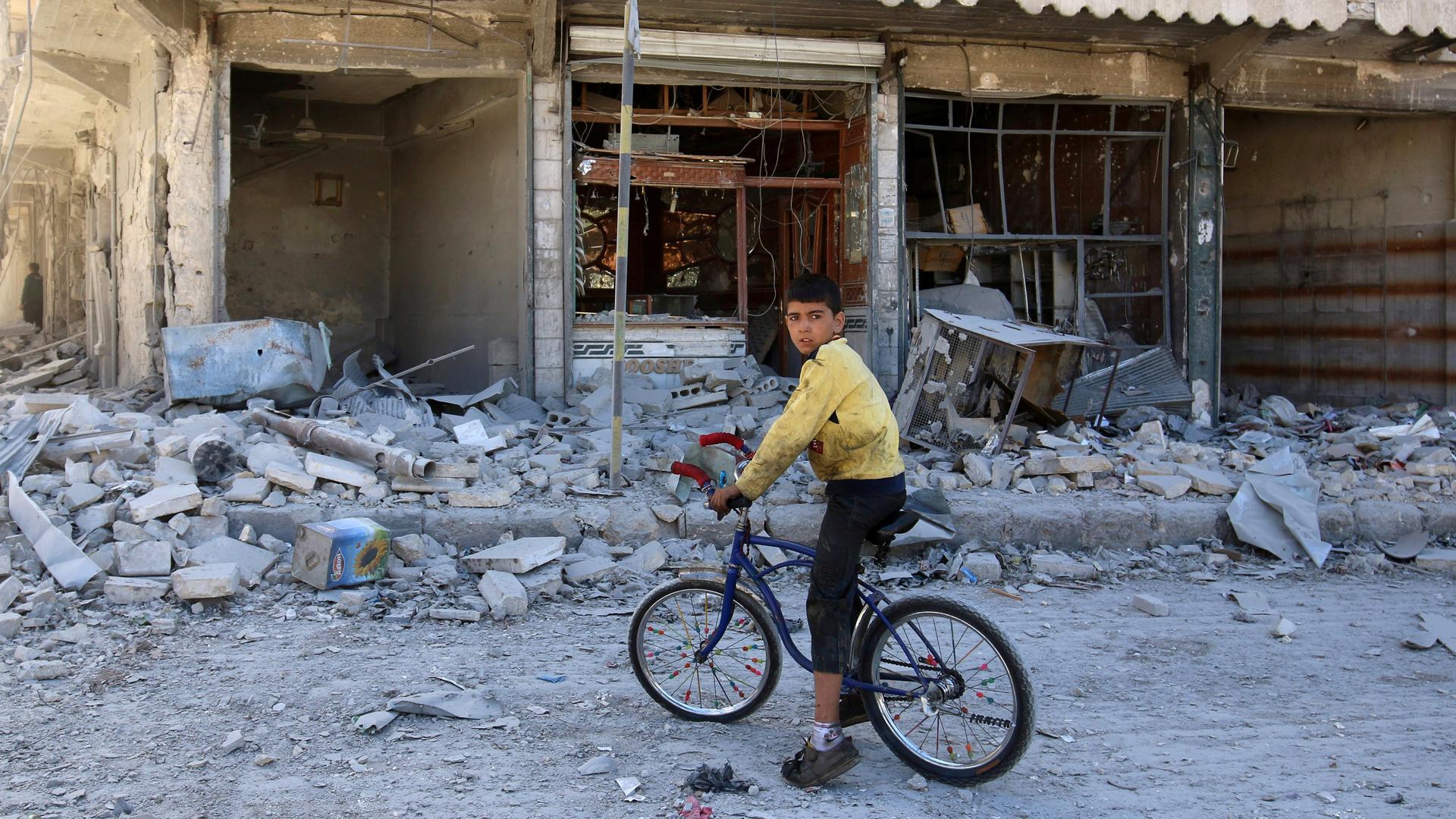A boy sits on a bicycle in front of damaged shops after an airstrike on the rebel held al-Qaterji neighborhood of Aleppo, Syria.
Even by the grim standards of Syria’s five-year-old civil war, the news from Aleppo has been particularly shocking in recent days.
Syrian military forces and their Russian allies appear to be trying to wipe out whatever remains of the opposition in the northern city with an intense bombing campaign.
“Continual bombardment, airstrikes going on throughout the day and night, and a huge number of children injured,” is how Caroline Anning of Save the Children described the situation in Aleppo. From the Turkish city of Antakya, near the Syrian border, she told the BBC that she was hearing from medical staff inside Aleppo who were struggling to keep up with the numbers of injured people, including many children.
“The casualties are piling up on the floor. They say the floors are flooded with blood, and they don’t have basic kit like ventilators, antibiotics, anesthetics to help those children,” Anning said.
The horrific news pouring out of Aleppo means there is no good excuse for ignoring what’s going on in Syria, says Zaher Sahloul, a Syrian American physician from Chicago.
“This is a huge catastrophe that is unfolding in front of our eyes,” says Sahloul, who traveled to Aleppo to care for the wounded during this past summer. And he says the question that Hillary Clinton and Donald Trump need to answer is this: “What should we do to stop the bleeding in Syria?”
“We have a responsibility as the most powerful country in the world to stop this genocide,” Sahloul says.
Sahloul says the Obama administration deserves credit for providing humanitarian aid to Syrians. But he says President Barack Obama is also guilty of allowing the Syrian regime to kill its own people with impunity.
“President Obama basically wanted not to intervene, I think that was the major principle in Syria,” Sahloul says.
As they begin the final phase of thier presidential campaigns, Sahloul says Clinton and Trump should talk about what they would do differently in Syria.
Amr al-Azm is also Syrian American. He teaches Middle East history and anthropology at Shawnee State University in Ohio, and is part of the Syrian opposition.
Azm says the Obama administration made a decision not to take strong action against the Syrian regime for its atrocities. He wants to know if that would change with the next president.
“When are we going to see the United States provide assertive leadership?” Azm asks. “Because that’s what the rest of the world, rightly or wrongly, is waiting for.”
“Whether we like it or not, that’s what the Europeans are waiting for. That’s what the rest of the international community is waiting for,” Azm says.
If he had the chance to ask Clinton and Trump a question about Syria, Azm says he would ask them about "red lines," points at which the United States would consider itself obligated to intervene. Where would the candidates draw red lines for the Assad regime? And how would they force the Syrian military to stop killing civilians?
“Also, what pressure or what means would they have to persuade the Russians, who are also involved in this carnage?” Azm asks.
The civil war in Syria presents a daunting tangle of national security issues for any US president. Beyond the humanitarian disaster, there is the rise of extremist groups like ISIS, the political breakdown of Syria itself, the chaos spreading across Syria’s borders, and the refugee crisis that reaches into Europe.
“The recent failure with Russian initiatives over Syria shows that Obama’s ‘Plan A’ hasn’t worked,” says Andrew Tabler of the Washington Institute for Near East Policy.
Tabler says his question to Clinton and Trump is: “What’s your ‘Plan B’? What can you do differently?”
If there’s one thing Syria watchers seem to agree on, it’s the fact that there is so much at stake in the country — and that the current US approach in Syria is not working very well.
Every day, reporters and producers at The World are hard at work bringing you human-centered news from across the globe. But we can’t do it without you. We need your support to ensure we can continue this work for another year.
Make a gift today, and you’ll help us unlock a matching gift of $67,000!
